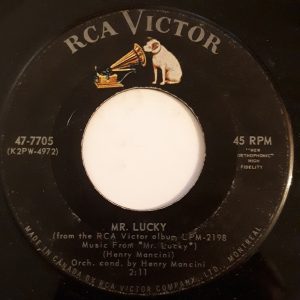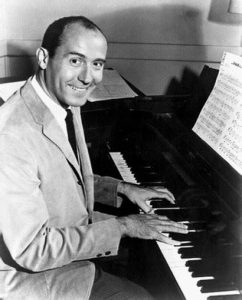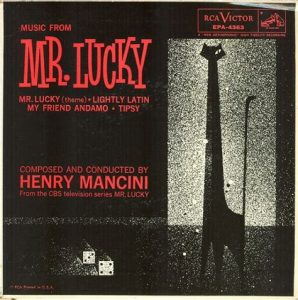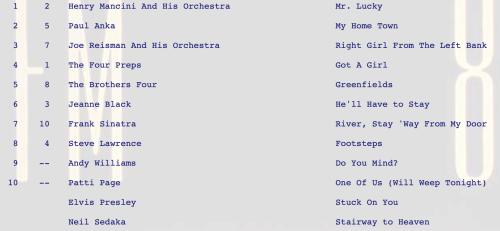#34: Mr. Lucky by Henry Mancini
City: Hull, QC
Radio Station: CKCH
Peak Month: June 1960
Peak Position in Hull ~ #1
Peak position in Vancouver ~ #15
Peak Position on Billboard Hot 100 ~ #21
YouTube: “Mr. Lucky”
Enrico Nicola Mancini was born in Maple Heights, Ohio, in 1924. Both his parents were Italian immigrants to the USA. At age eight Enrico learned to play the piccolo. He later studied at the Juilliard School of Music. When he turned 18 he enlisted in the United States Army he met Glenn Miller at basic training. Owing to a recommendation by Miller, Mancini was first assigned to the 28th Air Force Band before being reassigned overseas to the 1306th Engineers Brigade in France. In 1945, he helped liberate the Mauthausen-Gusen concentration camp in Austria. In 1946, he became a pianist and arranger for the newly re-formed Glenn Miller Orchestra, led by ‘Everyman’ Tex Beneke. (Glenn Miller was declared missing in action after his plane disappeared over the English Channel in December 1944). In 1952, Henry Mancini joined Universal Studios’ Universal-International music department. In 1952 he scored music for The Raiders, and in 1953 for The Glenn Miller Story.
These were the first few of a hundred films Mancini scored music for. Notable among these films are The Benny Goodman Story, Mr. Hobbs Takes A Vacation, Charade, The Great Race, The Molly Maguires, That’s Entertainment, The Return of the Pink Panther, The Return of the Pink Panther, The Pink Panther Strikes Again, The Prisoner of Zenda, That’s Dancing and many more. In 1958, Mancini left Universal to become an independent composer/arranger.
In 1959, Henry Mancini won two Grammy Awards for The Music from Peter Gunn. The first was for Album of the Year and the second was for Best Arrangement. However, it was Ray Anthony’s instrumental cover of “Peter Gunn” that was a top selling single, peaking at number-one in Vancouver in March 1959 and #8 on the Billboard Hot 100. In May 1960, “Mr. Lucky” peaked at #15 on the CKWX Sensational Sixty in Vancouver. The instrumental was the theme music for the popular TV adventure-drama series Mr. Lucky, which aired in the 1959-60 season.



Despite the fact that the show was one of the highest-rated new series of the 1959–1960 season, being ranked 21st among programs with a 24.4 average household share, Lever Brothers (and alternate sponsor Brown & Williamson) cancelled their sponsorship at the end of the season. CBS could not find other sponsors to replace them, and finally cancelled the series. John Vivyan believed the program was pulled in order to give up its Saturday time slot, as a favor to Jack Benny, to a new drama in the fall of 1960, Checkmate, which was produced by Benny’s company, JaMco Productions.
According to Henry Mancini in his autobiography, Blake Edwards himself canceled the show because of the format change:
“Mr. Lucky,” a very stylish story about a suave, hip guy who runs a gambling boat somewhere off the California coast, was an immediate success. But it went on the air shortly after the TV quiz show scandals … That and other scandals had cast a pall over the industry, and the network executives were frightened of any hint of moral criticism. “Mr. Lucky” became the target, particularly in the South, of that element in the American population that later became known as the moral majority. They took umbrage that the character ran a gambling boat, and around the fourth or fifth show Blake began to get pressure from CBS. The sponsor didn’t seem to be concerned, but CBS insisted that Blake change Mr. Lucky’s character from that of gambler to restaurateur and turn the ship into a restaurant. Blake fought, telling CBS, “You’ll take the balls out of the whole story.”
“In the event he went along with them, and the minute Mr. Lucky lost his gambling boat, the ratings took a nosedive. No longer excellent, they remained good enough to keep the show on the air, but Blake was unhappy. At the end of the year, he said, “I’m not gonna lend my name to this,” and closed the show down.
“Mr. Lucky” peaked at #1 in Hull (QC), #2 in Kalamazoo (MI) and Salt Lake City, #3 in Schenectady (NY), Ottawa, and San Bernardino (CA), #4 in Albany (NY), St. Joseph (MI), and Rochester (NY), #5 in Pittsburgh and Los Angeles, #6 in Binghamton (NY), West Yarmouth (MA), Caribou (ME), and Bethesda (MD), #7 in New York City, Wichita (KS), Cambridge (MA), Buffalo, Oklahoma City, and Chicago, #8 in Rockville (MD), Washington DC, and Ventura (CA), #9 in Nashua (NH), Arlington (VA), Phoenix, Portland (OR), Cincinnati (OH), and San Francisco, and #10 in Toledo (OH), #13 in Toronto, and #15 in Vancouver (BC).
In 1961, Mancini won two Academy Awards, one for “Moon River” for Best Original Song and one for Best Scoring of a Dramatic or Comedy Picture for the movie Breakfast at Tiffany’s. Mancini’s instrumental “Moon River” climbed to #11 on the Billboard Hot 100 and #11 on the CKWX Fabulous Forty in Vancouver. In 1962, he won Best Original Song again, this time for “Days of Wine and Roses”. The single failed to chart in Vancouver, and in the USA it stalled at #33 on the Hot 100. Other music he composed for film, Hatari and Charade, won him further acclaim.
In early 1964, “The Pink Panther Theme” cracked the Top 40 on the Billboard Hot 100, though it didn’t chart in Vancouver. However, Mancini’s next single release, “A Shot In The Dark”, found its way onto the CKLG Silver Dollar Survey for nine weeks over the winter of 1964-65 in Vancouver.
A Shot In The Dark is the film sequel to The Pink Panther. The film opens late at night at the country home of millionaire Benjamin Ballon, several of its occupants are moving about rooms, hiding and spying on others. The household consists of: Ballon’s wife Dominique; Henri Lafarge, the head butler, and his wife Madame Lafarge, the cook; Miguel Ostos, the head chauffeur; Pierre, the second chauffeur, and his wife Dudu, the head maid; Georges the gardener, and his wife Simone, the second maid; Maria Gambrelli, the third maid; and Maurice, the second butler. The night’s events soon end with gunshots in the room of Maria, and Miguel found murdered. Inspector Clouseau of the Sûreté, a bumbling and incompetent detective, is called out to the scene to solve the murder. The film concerns shots of bullets in the dark of night, and so the film title: A Shot In The Dark. The movie was one of the 13 most popular films in the UK in 1965.
The followup to “A Shot In The Dark” was “Dear Heart”. Though it stalled at #77 on the Billboard Hot 100, the single climbed to #16 in Vancouver. In 1968, Henry Mancini recorded his biggest hit record “Love Theme From Romeo and Juliet”. The instrumental topped the Billboard Hot 100 and was also number-one in Vancouver, enjoying eight weeks in the Top Ten. Mancini’s final appearance in the Top 40 of the Billboard Hot 100 was in 1971 with the theme to “Love Story”. The instrumental peaked at #13 on the Billboard chart, and #10 in Vancouver. He won Best Original Score again in 1982 for the movie Victor/Victoria.
Mancini was nominated for 72 Grammy Awards and won 20. He was nominated for 18 Academy Awards and won four. He also won a Golden Globe Award and was nominated for two Emmy Awards. Over the years, Mancini also composed and scored music for many TV shows, including Newhart, Remington Steele, Tic Tac Dough, and Hotel.
In 1994, Henry Mancini died of pancreatic cancer at the age of 70.
September 6, 2024
Ray McGinnis
References:
John Caps, Henry Mancini: Reinventing Film Music, (University of Illinois, 2012).
Richard Severo, “Henry Mancini dies at 70, Composer for films and TV,” New York Times, June 15, 1994.
“Berklee honors late Henry Mancini,” Associated Press, May 12, 1997.

CKCH 970-AM Hull (QC) Top 12 | June 25, 1960

Leave a Reply